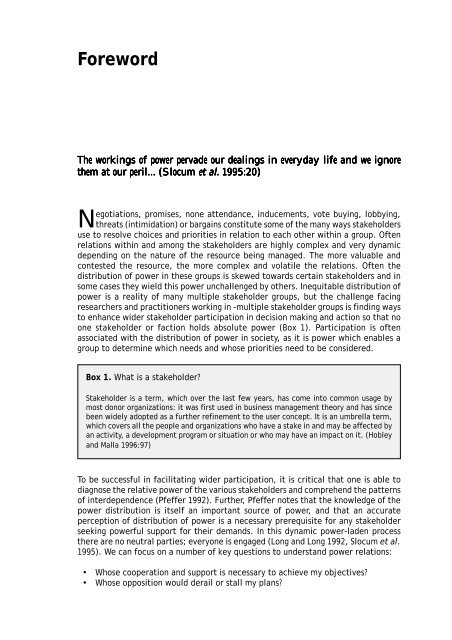Where the power lies: multiple stakeholder politics over natural ...
Where the power lies: multiple stakeholder politics over natural ...
Where the power lies: multiple stakeholder politics over natural ...
You also want an ePaper? Increase the reach of your titles
YUMPU automatically turns print PDFs into web optimized ePapers that Google loves.
Foreword<br />
The The workings workings of of <strong>power</strong> <strong>power</strong> pervade pervade our our dealings dealings in in in everyday everyday life life and and and we we ignore ignore<br />
ignore<br />
<strong>the</strong>m <strong>the</strong>m at at our our peril… peril… (Slocum (Slocum et et et et et al. al. al. al. al. 1995:20)<br />
1995:20)<br />
Negotiations, promises, none attendance, inducements, vote buying, lobbying,<br />
threats (intimidation) or bargains constitute some of <strong>the</strong> many ways <strong>stakeholder</strong>s<br />
use to resolve choices and priorities in relation to each o<strong>the</strong>r within a group. Often<br />
relations within and among <strong>the</strong> <strong>stakeholder</strong>s are highly complex and very dynamic<br />
depending on <strong>the</strong> nature of <strong>the</strong> resource being managed. The more valuable and<br />
contested <strong>the</strong> resource, <strong>the</strong> more complex and volatile <strong>the</strong> relations. Often <strong>the</strong><br />
distribution of <strong>power</strong> in <strong>the</strong>se groups is skewed towards certain <strong>stakeholder</strong>s and in<br />
some cases <strong>the</strong>y wield this <strong>power</strong> unchallenged by o<strong>the</strong>rs. Inequitable distribution of<br />
<strong>power</strong> is a reality of many <strong>multiple</strong> <strong>stakeholder</strong> groups, but <strong>the</strong> challenge facing<br />
researchers and practitioners working in -<strong>multiple</strong> <strong>stakeholder</strong> groups is finding ways<br />
to enhance wider <strong>stakeholder</strong> participation in decision making and action so that no<br />
one <strong>stakeholder</strong> or faction holds absolute <strong>power</strong> (Box 1). Participation is often<br />
associated with <strong>the</strong> distribution of <strong>power</strong> in society, as it is <strong>power</strong> which enables a<br />
group to determine which needs and whose priorities need to be considered.<br />
Box 1. What is a <strong>stakeholder</strong>?<br />
Stakeholder is a term, which <strong>over</strong> <strong>the</strong> last few years, has come into common usage by<br />
most donor organizations: it was first used in business management <strong>the</strong>ory and has since<br />
been widely adopted as a fur<strong>the</strong>r refinement to <strong>the</strong> user concept. It is an umbrella term,<br />
which c<strong>over</strong>s all <strong>the</strong> people and organizations who have a stake in and may be affected by<br />
an activity, a development program or situation or who may have an impact on it. (Hobley<br />
and Malla 1996:97)<br />
To be successful in facilitating wider participation, it is critical that one is able to<br />
diagnose <strong>the</strong> relative <strong>power</strong> of <strong>the</strong> various <strong>stakeholder</strong>s and comprehend <strong>the</strong> patterns<br />
of interdependence (Pfeffer 1992). Fur<strong>the</strong>r, Pfeffer notes that <strong>the</strong> knowledge of <strong>the</strong><br />
<strong>power</strong> distribution is itself an important source of <strong>power</strong>, and that an accurate<br />
perception of distribution of <strong>power</strong> is a necessary prerequisite for any <strong>stakeholder</strong><br />
seeking <strong>power</strong>ful support for <strong>the</strong>ir demands. In this dynamic <strong>power</strong>-laden process<br />
<strong>the</strong>re are no neutral parties; everyone is engaged (Long and Long 1992, Slocum et al.<br />
1995). We can focus on a number of key questions to understand <strong>power</strong> relations:<br />
Whose cooperation and support is necessary to achieve my objectives?<br />
Whose opposition would derail or stall my plans?

















